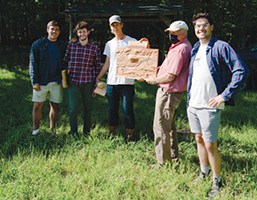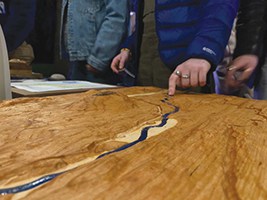There’s something kind of magical about a scale model, whether it’s a model train exhibit or a topographic model of Yosemite National Park or the iconic “Panorama of the City of New York.” They recreate vanished worlds, invent new ones, and invite us to contemplate life on a scale we cannot comprehend from street level.
It’s especially thrilling when these miniature land-scapes include something familiar: our home, for instance, or a favorite place or even a memory.

The Middlebury College students who founded Treeline Terrains, a company that manufactures 3-D, wood-carved topographical landscapes, donated a scale model of the Trail Around Middlebury to the Middlebury Area Land Trust last month.
But we can only get so close. “Please don’t touch,” the signs often say. These tiny worlds are fragile. See with your eyes, not your hands.
Treeline Terrains, a company founded by newly minted Middlebury College graduates, is taking the opposite approach. “Please touch,” they say, for it is possible to see with the hands.
Jacob Freedman, Alex Gemme and Nathaniel Klein produce 3-D wood-carved models of ski areas, mountains, lakes and other landscapes. Their goal is to “create topography you can touch,” they said.
They began experimenting with their first models three years ago and officially founded the company earlier this year, a few months before graduating.
Klein hand-glues layers of wood to make blocks. Freedman uses Geographic Information System (GIS) mapping to develop 3-D data files. Gemme brings the two together by operating a piece of machinery called a CNC — computer numerical control — mill that carves the wood.
They’ve made models of the Snow Bowl ski area in Hancock, Camel’s Hump, Mt. Mansfield, the Adiron- dacks High Peaks Wilderness and other landscapes, as well as custom models, examples of which can be found on their website, treelineterrains.com.
You can trace trails and rivers with your fingers and feel the rise and fall in elevation. It’s like reading the landscape with your hands.
And they’re sturdy. Last month, when Treeline Terrains presented a scale model of the Trail Around
Middlebury (TAM) as a gift to the Middlebury Area Land Trust (MALT), Freedman, Gemme and Klein came loping happily down a freshly mown path on the TAM carrying models and samples by the armful.
“These are great for kids, for tactile learners,” Gemme told MALT Programs Coordinator Caleb Basa and longtime trail volunteer John Derick. “Feel Belden’s Falls here, and here’s Chipman Hill, here’s downtown and here’s the college.”
Derick and Basa were impressed with the model, which is 24 inches long, 16 inches wide and 3 inches high.
“We’re going to use this in so many ways,” Basa said, and the two began brainstorming ideas for making the model available to the public.
Modeling mountains
Treeline Terrains has strong roots in ski culture.
Freedman, Gemme and Klein all taught skiing at the Snow Bowl, and in 2018 they developed a scholarship fund for Middlebury College students who might not otherwise be able to afford ski lessons, passes or lift tickets.
To celebrate the program’s success, they made a gift for their supporters — a 3-D model of the Snow Bowl made from scrap wood they found around campus.
The following year they donated two models to a fundraiser supporting young female athletes in Vermont.
Word started getting around about their budding venture.

A wood-carved scale model of the Trail Around Middlebury shows the nearly 19 miles of official paths, along with such
landmarks as the Otter Creek (painted blue) and Chipman Hill (near the center).
In 2020 the trio won a MiddChallenge grant from the college’s Innovation Hub, which helped pay for the equipment they needed to get serious, and this past January they developed their business plan in a J-Term course called MiddEntrepreneurs.
A video was made for the 2020 MiddChallenge competition, before Treeline Terrains had a name. The students’ mission and workflow have evolved quite a bit since then.
Their TAM model was made possible in part by the David S. Stone ’74 Tree House Fund, another program managed by the Innovation Hub, which “supports creative and innovative student projects that bridge community and campus,” said Innovation Hub Director of Programs Heather Neuwirth Lovejoy.
“I think [Jacob, Alex and Nathaniel] have really gained momentum during this year when Vermonters are feeling so grateful for our outdoor resources,” Lovejoy said. “MALT and the TAM have been such a tremendous resource for our community, and we saw students appreciating this resource more than ever this year. This was part of my rationale in funding the MALT/TAM project.”
Lovejoy has been impressed by the way the students collaborate with one another, each bolstering and sup- porting an aspect of the project, she said.
“These students are an exemplar of taking their academic work, talents and expertise and connecting with a social mission, in this case, cultivating a sense and appreciation of place through their gorgeous educational models. I feel humbled and honored to be one of the sup- porting partners during so many phases of their journey.”
Maps are for everyone
In addition to selling models in its online store, Treeline Terrains is hoping to form more partnerships with nonprofit organizations like MALT.
“If you are involved with a nonprofit working in the field of education, environmental conservation, public health, tribal policy, disability access, or more, we hope to work with you,” they wrote on their website, “and we hope that our 3-D models can support your work.”
The trio is currently working to develop 3-D models of the Sugarbush Ski Resort for Vermont Adaptive Ski and Sports, whose mission is to empower individuals with disabilities, promoting “independence and further equality through access and instruction to sports and recreational activities.”
Vermont Adaptive Ski and Sports Director of Communications Kim Jackson thinks what Treeline Terrains is doing is “pretty cool,” and their models “have the potential to really help our participants with visual impairments. Now these athletes, with the help of these models, can understand where Mt. Ellen is at Sugarbush Resort and prepare them for an outing with us… It’s a great, valuable project and we’re happy to be a part of it.”
Going for it
Freedman, Gemme and Klein have been operating their CNC mill in the barn of some friends in the town of Middlebury, Freedman said.
Now that they’ve graduated from Middlebury, they’re moving their operation to Klein’s grandfather’s house in Massachusetts, where Klein learned woodworking and carpentry.
The trio is hoping to work on Treeline Terrains full-time, Freedman said.
Lovejoy has high hopes for them.
“I am so excited for them as they launch into full-time work with Treeline Terrains after graduation and hope to continue to connect them back to Vermont.”
Christopher Ross is a reporter at the Addison Independent, a sister publication of the Mountain times, [email protected].



